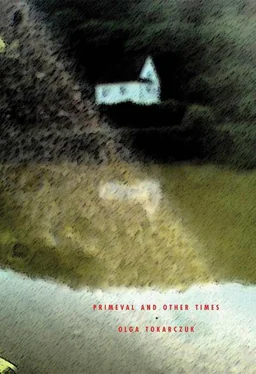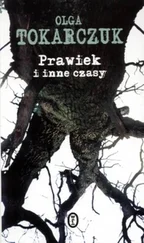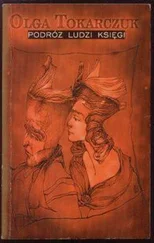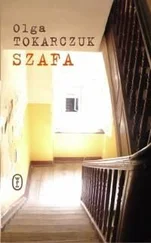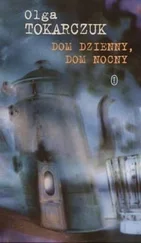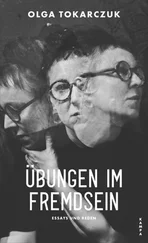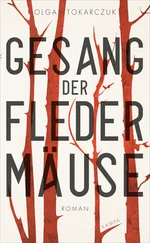“I want to leave here for the city, I want to travel, I want to have earrings and smart shoes.”
“No,” repeated Izydor and began to tremble. Water poured down his face and blurred his view of Primeval.
“Yes,” said Ruta and took a few steps backwards.
Izydor’s legs gave way under him. He was afraid he would fall over.
“I’ll only be in Taszów. It’s not far away!” she cried and turned towards the forest.
The Bad Man came to Wydymacz in the evening. He would emerge from the forest at dusk, and it looked as if he had come unglued from its wall: he was dark, on his face he had the shadow of the trees which never disappeared. Cobwebs shone in his hair, earwigs and maybugs roamed in his beard – it disgusted Cornspike. And he smelled different. Not like a man, but like wood, like moss, like a wild boar’s hair, like a hare’s fur. Whenever she allowed him to enter her, she knew she wasn’t copulating with a human. He wasn’t a human being, despite his human form, despite the two or three human words he was able to say. When she realised this, she was seized with terror, but excitement, too, at the idea that she herself was changing into a doe, a sow, an elk, that she was nothing more than a female animal, like billions of female creatures the world over, and that she had in her a male like billions of males the world over. Then the Bad Man let out a long, piercing howl that must have been heard all over the forest.
At dawn he would leave her, and on his way out he always pinched some of her food. Many times Cornspike tried to follow him through the forest to spot his hideout. If she knew where it was, she would have more power over him, because in his hiding place an animal or a man reveals the weak sides of his nature.
She never succeeded in tracking the Bad Man further than to the big lime tree. If she turned her gaze for just a moment from his hunched shoulders flashing between the trees, the Bad Man vanished, as if the earth had swallowed him.
Finally Cornspike realised that she was betrayed by her human, female smell, and so the Bad Man knew he was being followed. So she gathered some mushrooms and tree bark, took some pine needles and leaves, and put it all in a stone pot. She poured in rainwater and waited a few days. And when the Bad Man came to her, and then at dawn went off into the forest with a bit of pork fat between his teeth, she quickly undressed, smeared the mixture on herself and set off after him.
She saw him sit down on the grass at the edge of a meadow and eat the pork fat. Then he wiped his hands on the ground and went into the long grass. In an open space he looked around fearfully and sniffed. Once he even fell to the ground, and only a little later did Cornspike hear the rattle of a cart on the Wola Road.
The Bad Man went into Papiernia. Cornspike threw herself down in the grass now and, bending close to the earth, ran after him. When she found herself at the edge of the forest, she couldn’t see him anywhere. She tried sniffing, just as he did, but she couldn’t smell anything. She hung about helplessly under a large oak tree, when suddenly a branch fell beside her, then another, and a third. Cornspike realised her mistake, and looked up. The Bad Man was sitting on a branch of the oak tree, baring his teeth. She felt terrified of her nocturnal lover. He didn’t look like a human being. He growled at her in warning, and Cornspike realised she must go away.
She went straight to the river, where she washed off the odours of the earth and forest.
Ukleja’s Warszawa car went as far as it was possible to go. Then he had to get out and walk the last few metres on foot. He tripped on the ruts in the forest road and cursed. Finally he was standing outside Cornspike’s half tumbledown cottage, spitting with rage.
“Good woman, if you please, I’ve business to discuss with you!” he called.
Cornspike came outside and stared straight into Ukleja’s bloodshot eyes.
“I won’t give her to you.”
For a moment he lost his confidence, but instantly pulled himself together again.
“She’s already mine,” he said calmly. “She merely insists that you have to bless her. I am to ask you for her hand.”
“I won’t give her to you.”
Ukleja turned towards the car and shouted:
“Ruta!”
A moment later the door opened and Ruta got out of the car. Her hair was short now, with curls of it escaping from under a little hat. In a narrow skirt and heels she seemed very slender and very tall. In those shoes of hers she hobbled along the sandy road. Cornspike looked at her possessively.
Ruta stopped beside Ukleja and hesitantly put her arm through his. This gesture gave Ukleja the courage he needed.
“Bless your daughter, woman, because we haven’t much time.”
He gently pushed the girl forwards.
“Go home, Ruta,” said Cornspike.
“No, Mama, I want to marry him.”
“He’ll do you wrong. I’ll lose you because of him. He’s a werewolf.”
Ukleja laughed.
“Ruta, let’s go… this is pointless.”
The girl abruptly turned to face him and threw her handbag at his feet.
“I’m not going until she lets me!” she cried in anger.
She walked up to her mother. Cornspike hugged her, and they stood like that until Ukleja began to grow impatient.
“Let’s go, Ruta. You don’t have to convince her. No means no. What a fine lady of the manor…”
Then Cornspike spoke to him over her daughter’s head.
“You can take her, but on one condition.”
“Well?” said Ukleja, intrigued. He liked bargaining.
“From October to the end of April she is yours. From May to September she is mine.”
The amazed Ukleja looked at her as if he didn’t understand. Then he started counting the months on his fingers, and found that this division was not even, and that he profited by it. He had more months than Cornspike. He smiled slyly.
“All right, so be it.”
Ruta took her mother’s hand and laid it on her own cheek.
“Thank you, Mama. I’ll be fine. I’ve got everything I could wish for there.”
Cornspike kissed her brow. She didn’t even glance at Ukleja as they left. Before it got going, the car emitted clouds of grey smoke, and for the first time in their lives the trees in Wydymacz got a taste of exhaust fumes.
For his family and colleagues from work, for the secretaries and lawyers, Paweł gave a name-day party in June, on Saint Peter’s and Saint Paul’s day. But for his birthday he only ever invited Ukleja. Birthdays are for close friends, and Paweł had one close friend.
When the children heard the dull whirr of the Warszawa car, they ran away in panic to the hideout under the stairs. Unaware that he caused terror, Ukleja brought the children a large thermos of ice cream and wafers in a cardboard box.
In a blue maternity dress, Misia asked them to come and sit at table in the living room, but they were reluctant to take their places. Izydor stopped Ruta in the doorway.
“I’ve got some new stamps,” he said.
“Izydor, don’t pester the guests,” Misia scolded him.
“You look lovely in that fur coat, like the Snow Queen,” Izydor whispered to Ruta.
Misia began to serve the food. There were jellied pig’s feet and two kinds of salad. There were plates of cold meat and stuffed egg shells. There was bigos stew heating up and chicken thighs sizzling in the kitchen. Paweł filled the shot glasses with vodka. The men sat opposite each other and talked about the prices of animal hides in Taszów and Kielce. Then Ukleja told a dirty joke. The vodka kept disappearing down their throats, and the glasses seemed too small to slake their bodies’ monstrous thirst. And the men still seemed sober, though their faces had gone red and both had undone their collars. Finally their eyes misted over, as if they had frozen from the inside. Then Ruta followed Misia into the kitchen.
Читать дальше
